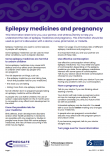Topiramate
Sounds like 'toe-pye-rah-mate'
Key points about topiramate
- Topiramate is used to treat epilepsy and to prevent migraine headaches.
- Topiramate is used to treat epilepsy by preventing seizures and to help prevent migraine headaches.
- Find out how to take it safely and possible side effects.

Topiramate is used to treat epilepsy by preventing seizures and to help prevent migraine headaches. It reduces how often you get migraines but it will not treat a migraine once it has started. Topiramate works by reducing bursts of electrical activity in your brain and restoring the normal balance of nerve activity.
| In Aotearoa New Zealand, topiramate is available as different brands (Topamax, Arrow-Topiramate, Topiramate Actavis). It's important to keep to the same brand, especially when it is used for epilepsy. Avoid switching brands. |
In Aotearoa New Zealand topiramate is available as tablets (25 mg, 50 mg, 100 mg and 200 mg) and sprinkle capsules (15 mg and 25 mg).
- The dose of topiramate will be different for different people.
- Your doctor will start you on a low dose and increase it slowly over a few weeks to reduce side effects such as drowsiness.
- Topiramate is usually taken twice a day but sometimes when starting topiramate it is taken once a day for a week or more.
- Always take your topiramate exactly as your doctor has told you. The pharmacy label will tell you how much to take, how often to take it and any special instructions.
- Timing: You can take topiramate with or after food. Take topiramate at the same times each day.
- If you are taking it twice a day, take your doses in the morning and night.
- If you are taking it once a day, then it's best taken at bedtime.
- Swallow your tablets or capsules whole with a full glass of water, milk or juice. Don't chew them. If swallowing the capsules is a problem, you can open the capsules and carefully sprinkle the beads onto a small amount of soft food such as a teaspoon of porridge, yoghurt or custard. Swallow all of the food straight away. Don't chew the beads.
- Missed dose: If you forget to take your dose, take it as soon as you remember if it is within 4 hours of when your dose was due. But if more than 4 hours have passed since the dose was due, just take the next dose at the right time. Don't take double the dose.
- Keep taking topiramate every day. It may take a few weeks before you notice the full benefits of topiramate. Don't stop taking topiramate suddenly; talk to your healthcare provider before stopping because it can cause seizures if you stop taking it suddenly.
Here are some things to know when you're taking topiramate. Other things may be important as well, so ask your healthcare provider what you should know about.
Drink plenty of water
Make sure you drink plenty of water to keep well hydrated while you are taking topiramate. It's important because topiramate can increase your body temperature and reduce sweating – especially during hot weather and when you exercise. This can put you at risk of getting dehydrated and can cause kidney stones. Tell your doctor immediately or ring Healthline 0800 611 116 if you get sudden pain in the stomach (tummy) area, difficulty passing urine (pee) or blood in your urine.
Taking other medicines
Topiramate can interact with some other medicines and herbal supplements, so check with your doctor or pharmacist before starting topiramate and before starting any new medicines or products.
Contraception
Taking anti-seizure medicines while you are pregnant can potentially harm your unborn baby. If you're a sexually active female and are taking topiramate, use 2 forms of effective contraception (such as an IUD and condoms) for the whole time you're taking topiramate and for 4 weeks after stopping it.
Talk to your healthcare provider before choosing your second method, as some contraceptives may not work as well while you're taking topiramate, and for 4 weeks after you've stopped taking it. Read more about epilepsy and contraception.
If you are planning a pregnancy
When you're taking topiramate it's extremely important to plan a pregnancy. You need to see your doctor 6 to 12 months before you'd like to become pregnant so that you can reduce any risks to your baby. Read more about epilepsy and pregnancy.
- All anti-seizure medicines in pregnancy have the potential to harm an unborn child but the risks are higher with some medicines, including topiramate, especially early in your pregnancy and at higher doses. If you have epilepsy, having seizures while you are pregnant can also harm your unborn baby, so it is important to keep taking an anti-seizure medication.
- Talk with your healthcare provider to agree on a plan about how to manage your medicines and your dose.
If you are pregnant or think you might be pregnant, keep taking your medicine at the right dose, and contact your healthcare provider, tell them you think you are pregnant and get an urgent appointment to see them
For more information, read:
Like all medicines, topiramate can cause side effects, although not everyone gets them. If you're concerned about any symptoms you think might be related to your medicine, talk to your healthcare provider. The following information offers some guidance but doesn't include all possible side effects.
Common side effects
Tell your healthcare provider if these side effects bother you.
- Feeling sleepy, drowsy or dizzy. Be careful when driving or using tools until you know how this medicine affects you. Limit or avoid alcohol as this can make these side effects worse. Read more epilepsy/seizures and driving(external link).
- Runny poo (diarrhoea) or constipation.
- Stuffy, runny nose and sore throat.
- Dry mouth or changes in taste.
- Tingling in the arms and legs.
Tell your healthcare provider immediately or phone Healthline free on 0800 611 116 if these occur
- Low mood, suicidal thoughts — thoughts of harming yourself.
-
Problems with your eyesight. Topiramate can cause increased pressure in your eye. This can cause symptoms such as blurred vision, eye pain, nausea (feeling sick), vomiting (being sick), and headache. This can happen within one month of starting treatment.
Read more about medicines and side effects and reporting a reaction you think might be a side effect.
The following links provide further information on topiramate:
Topamax(external link) Medsafe Consumer Information Sheets, NZ
Topiramate for children(external link) New Zealand Formulary for Children, NZ
Brochures
5 questions to ask about your medications(external link) Health Quality and Safety Commission, NZ, 2019 English(external link), te reo Māori(external link)
References
- Avoid switching brands of topiramate(external link) Medsafe, NZ, 2020
- Prescribing issues associated with anticonvulsant medications for epilepsy(external link) BPAC, NZ, 2009
- Topiramate(external link) New Zealand Formulary
- Topamax(external link) New Zealand datasheet
Brochures

Medicines and side effects
Healthify He Puna Waiora, NZ, 2024

Epilepsy medicines and pregnancy
Medsafe, NZ, 2025

Health Quality and Safety Commission, NZ, 2019 English, te reo Māori
Credits: Sandra Ponen, Pharmacist, Healthify He Puna Waiora. Healthify is brought to you by Health Navigator Charitable Trust.
Reviewed by: Angela Lambie, Pharmacist, Auckland
Last reviewed:
Page last updated:





